 Republican Representatives Patricia Morgan and Dan Reilly have been making a major push to stop the truck tolls in the RhodeWorks proposal. With great vigor, they have branded their efforts as anti-toll, specifically making the argument that the truck tolls are a step on the way to car tolls. Yet despite their stated opposition to tolls, Morgan and Reilly have signed onto a bill that would drastically expand tolls in Rhode Island.
Republican Representatives Patricia Morgan and Dan Reilly have been making a major push to stop the truck tolls in the RhodeWorks proposal. With great vigor, they have branded their efforts as anti-toll, specifically making the argument that the truck tolls are a step on the way to car tolls. Yet despite their stated opposition to tolls, Morgan and Reilly have signed onto a bill that would drastically expand tolls in Rhode Island.
The bill, which is sponsored by conservative Democrat Jared Nunes, creates a special board with the power to privatize any transportation project, allowing private corporations to levy unrestricted tolls on Rhode Island road users. Under the proposal, private corporations could approach the privatization board, and the board could approve privatization with tolls without any required legislative approval. (The bill does provide for entirely optional legislative review.) The language in the legislation is extremely broad, allowing a wide array of potential tolling schemes, including tolls on passenger cars.
As part of the Republican Policy Group’s campaign against RhodeWorks, Morgan and Reilly supported an alternate proposal without tolls. Controversially, their plan did not specify where all the money would come from. At the heart of their proposal was redirecting DMV revenue, money that has already been spoken for in the state budget. (This redirecting revenue tactic is not unique to the GOP. During her campaign, Gina Raimondo proposed paying for school construction by redirecting sales tax revenue that was already being used in the budget.) Despite this, the Republican Policy Group’s anti-toll plan became a major initiative of Morgan, Reilly, and other Republican representatives.
Privatizing roads and bridges to let private corporations charge tolls is a popular policy idea among Republicans across the country. In Indiana, for instance, Republican Governor Mitch Daniels successfully championed a plan to sell off the right to toll Interstate 90 to a foreign corporation, saying, “You’re either for this bill, or you’re against our future.” (Later, the plan went bankrupt.)
]]>
State leaders presented their revised truck toll plan at the State House today, with legislation being introduced in both the House and the Senate this afternoon.
“This proposal fixes our roads and bridges and is good for our economy,” said Speaker of the House Nicholas Mattiello, “We are not going to be last any more.”
“New plan expressly prohibits tolling passenger vehicles because this was “important to Rhode Islanders,” said Senate President Teresa Paiva Weed.
RIDOT director Peter Alviti, Jr. said 150 structurally deficient bridges and 50 not quite deficient bridges will be repaired over the next ten years in this plan. 14 gantry locations have been identified “right now.”
By 2025 we will have the bridges in this state only 10% structurally deficient, said Alviti.
We have requests for an additionally $600 million in repair requests from local cities and towns, said Alviti.
RhodeWorks is the same program, funding is different, said Alviti.
This will rely on Garvey bond/financing, with some savings through refinancing, said Raimondo, Mattiello and Paiva Weed. It leverages federal money.
It’s the way these things are always done in Rhode Island, said Raimondo.
Connecticut will be tolling cars and trucks next year, said Mattiello. “We can’t have a robust economy with the worst infrastructure in the country.”
“It’s the best approach for Rhode Islanders,” said Mattiello. “Don’t listen to the rhetoric of trucks today, cars tomorrow.”
The RI Constitution is a “sacred document and you don’t change it over de minimus issues,” said Mattiello.
“The avoidance and diversion issue is not as real an issue as some people suggest,” said Mattiello, in essence denying that trucks will drive too far out of their way to avoid tolls.
Here’s the press release:
Governor Gina M. Raimondo, House Speaker Nicholas A. Mattiello, and Senate President M. Teresa Paiva Weed this afternoon announced revised RhodeWorks legislation that takes into account new federal funding. The legislation puts people back to work repairing our crumbling infrastructure and provides the reliable, sustainable source of revenue necessary to rebuild our bridges, which are ranked the worst in the country.
With the addition of the new federal funding, the revised legislation cuts the amount of bonding in half (from $600 million to $300 million) and reduces interest costs by more than 65%. The legislation also strengthens the prohibition on tolling passenger vehicles by adding a condition that a vote of the people be required for any legislative changes to toll cars.
See the comparison here: http://www.dot.ri.gov/documents/news/RhodeWorks_Bill_Comparison.pdf
And a fact sheet on the updates here: http://www.dot.ri.gov/documents/news/RhodeWorks_Fact_Sheet.pdf
The legislation will be introduced this afternoon in the House by Majority Leader John DeSimone and in the Senate by Majority Leader Dominick Ruggerio.
The Governor, Speaker, and Senate President issued the following statements today:
Governor Gina M. Raimondo
“I am grateful for the partnership of the Speaker and Senate President to take action and get this done. Rhode Island has the worst bridges in the country: we’re ranked 50th out of 50 states. We can no longer afford the politics of procrastination; we need to invest more. This proposal will allow us to move quickly to repair our roads and bridges, and put Rhode Islanders back to work, without raising taxes on Rhode Island families and small businesses.
“Because of new federal funding, we were able to strengthen the proposal: we’ve lowered the maximum truck toll amount, decreased the number of gantries, and significantly reduced the state’s interest payments. I look forward to continuing to work with the House and Senate to pass this legislation and grow our economy.”
House Speaker Nicholas A. Mattiello:
“I commend the Governor for taking into account the additional federal highway funding heading to our state and proposing a vastly improved plan to the legislature that will create jobs, increase our state’s wealth, and most importantly, repair our badly deficient roads, bridges and overpasses. A sound infrastructure is essential to a thriving economy, and this is a step we must take to be more competitive with other states. The new federal money also allows our state to borrow much less with greatly reduced interest costs and risk.
“Despite the scare tactics of opponents of this proposal who only want to hold our economy back, the toll plan only includes large commercial trucks. There are now safeguards in the legislation to assure our citizens that tolls will never be extended to cars without voter approval.”
Senate President M. Teresa Paiva Weed:
“The passage of federal highway funding in December has enabled the development of a new RhodeWorks plan that dramatically reduces borrowing. Most Rhode Islanders agree we need to invest in our roads and bridges. The Governor’s RhodeWorks plan remains the best proposal to address this challenge. It provides the surge in funding which is necessary to accomplish projects quickly, and save taxpayers from more costly repairs in the long run. It would toll only large tractor trailer trucks, the ones causing most of the vehicle-caused damage to our roads and bridges, while expressly prohibiting extension of tolls to passenger vehicles.”
[From a press release]
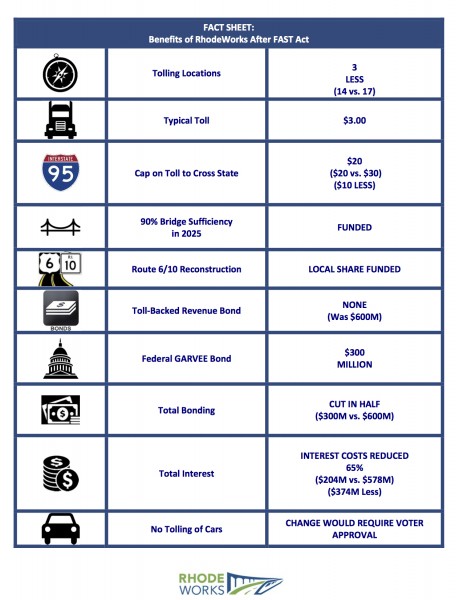
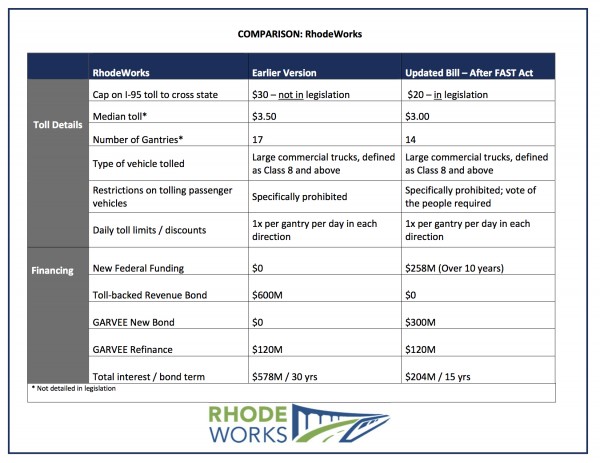
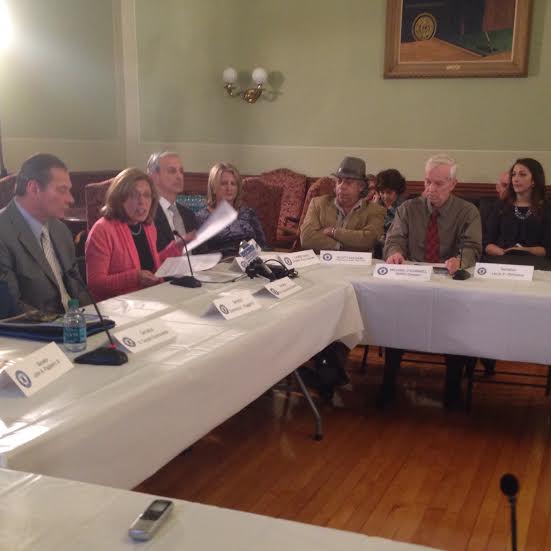 Senate President Teresa Paiva Weed said her Grow Green Jobs RI initiative would help Rhode Island become the national leader in green, sustainable and resilient industries.
Senate President Teresa Paiva Weed said her Grow Green Jobs RI initiative would help Rhode Island become the national leader in green, sustainable and resilient industries.
“There is great potential within the emerging green industries,” she told me in an extended interview one day after introducing a report that lays out her policy recommendations. “If we as a state position ourselves to maximize all available opportunities it will in fact move us forward and secure for us national recognition.”
The initiative already enjoys broad support in the private sector – from the chamber of commerce to organized labor, she pointed out. And she expects legislators from both chambers will champion the bills as protecting the environment is a bi-partisan cause in the Ocean State. “House, Senate, Democrat, Republican and I guess each of us have an independent,” she said. “It’s really a shared value.”
Carbon pricing bill
Paiva Weed is reserving judgment on the carbon pricing bill introduced yesterday in the House by Rep. Aaron Regunberg. “There is obviously not the same kind of agreement among business and environmentalists on that issue as many are concerned about Rhode Island being an outlier,” she told me. “I absolutely support the goal of the legislation without question. The question is from a business point of view how do we as a region, as a country, internationally, remain competitive and address our concerns regarding carbon.”
Tolls
Representing Newport and Jamestown, Paiva Weed serves the only two communities in Rhode Island that already have toll gantries. She said local bridges managed by the Turnpike and Bridge Authority, funded by tolls, are in demonstrably better condition than those maintained by the DOT, funded through the state budget.
“We have safe, well maintained bridges in Newport, in Jamestown and in the Mt. Hope bridge for one reason: because the individuals who use those bridges pay tolls,” she said. “Every other overpass in the state that I can think of if you drive under is a danger. They are falling down, they are decrepit, they are a danger both to the people over and under them.”
Education
A staunch advocate of progressive education funding, Paiva Weed said Rhode Island needs to continue its recent tradition of increasing state education funding. She added that it’s important to fix the funding formula so that it stops punishing traditional school districts for sending a high number of students to charter schools.
“As charter schools have developed the structure of the funding formula failed to recognize that there would be a tipping point at which the diversion of funds from the traditional public education system would negatively impact the traditional public school system,” she said. “If we as a state supported school choice, which we said we did when we passed the legislation years ago creating charter schools, then we would need to recognize that tipping point and provide additional funds for communities that have more of a draw on their base from charters.”
Listen to the full 23 minute interview here:
]]> When Governor Gina Raimondo was a candidate, she did not promise to partner with the legislature to work out a solution to the problem of undocumented workers and access to driver’s licenses. She said that she would issue an executive order compelling the DMV to begin issuing such licenses within her first year in office. In fact, she signed her name to that promise. Raimondo has two days to make good on her word, or it will be a campaign promise broken.
When Governor Gina Raimondo was a candidate, she did not promise to partner with the legislature to work out a solution to the problem of undocumented workers and access to driver’s licenses. She said that she would issue an executive order compelling the DMV to begin issuing such licenses within her first year in office. In fact, she signed her name to that promise. Raimondo has two days to make good on her word, or it will be a campaign promise broken.
To remind her of her promise, members of RI Jobs With Justice, Fuerza Laboral, English for Action, the Providence Student Union and others rallied at the State House outside the House chambers, demanding that their voices be heard and that promises be kept. As Speaker Nicholas Mattiello puttered about inside the House chambers, metaphorically polishing his gavel and preparing for the new legislative session, advocates for licenses were lead in chants by Juan Garcia and shouted the Speaker’s name.
Mattiello ignored the protesters.
Overlapping with the “Licenses for All” rally was a “No Tolls” rally. This rally was made up primarily of conservative anti-tax groups. This coalition was protesting against the proposed truck tolls, which the tax groups feel are a slippery slope to car tolls. There was some friction when members of the anti-toll rally took issue with the undocumented workers agitating for licenses, with one angry man leading a small group in screaming, “Go home!” over and over again.
Later those rallying for licenses chanted, “We pay taxes!”
Speaker Mattiello told Gene Valicenti on WPRO that he didn’t, “expect to be moved” by the toll protest, and he seemed equally unmoved by the Licenses for All rally. One wonders what does move the Speaker if our democratic process and exercise of our First Amendment rights are so inconsequential.
Time running out for Raimondo to keep undocumented resident driver’s license promise
Coalition demands driver’s licenses for all, regardless of immigration status


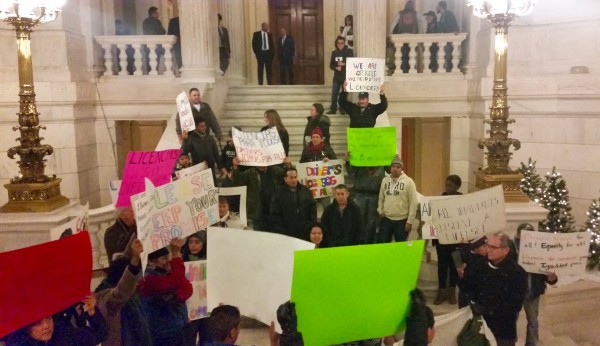
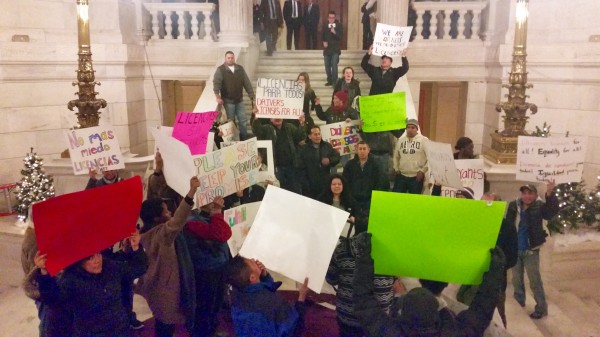


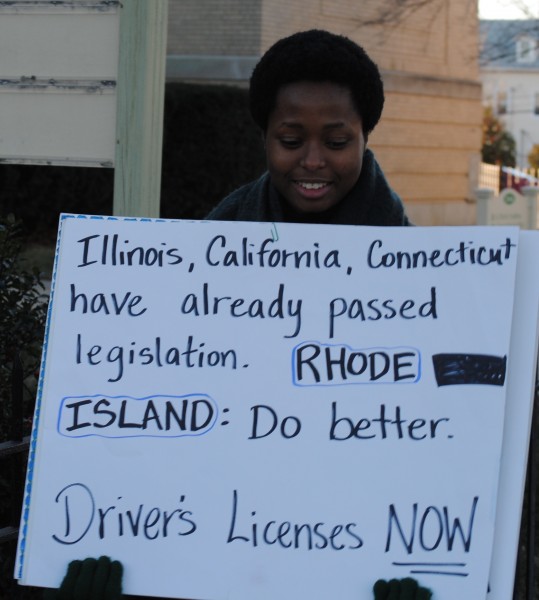
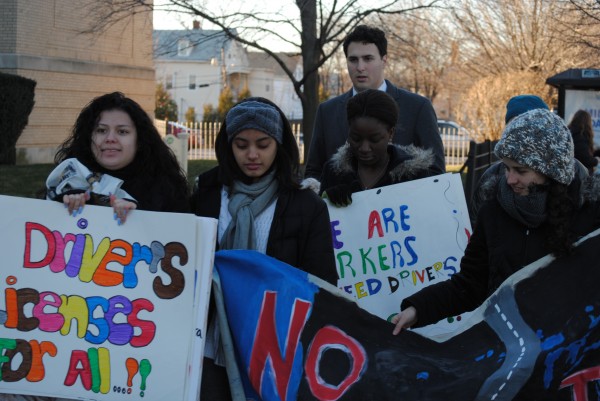
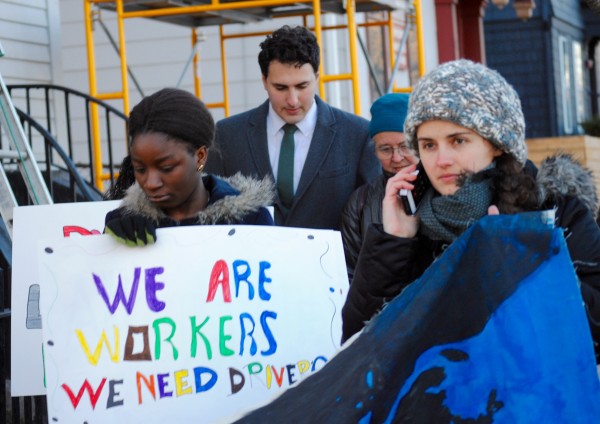
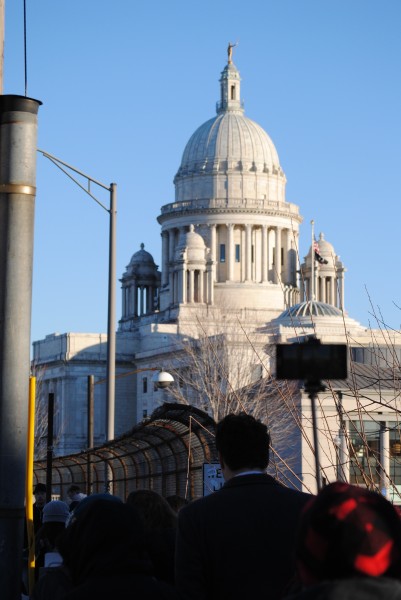

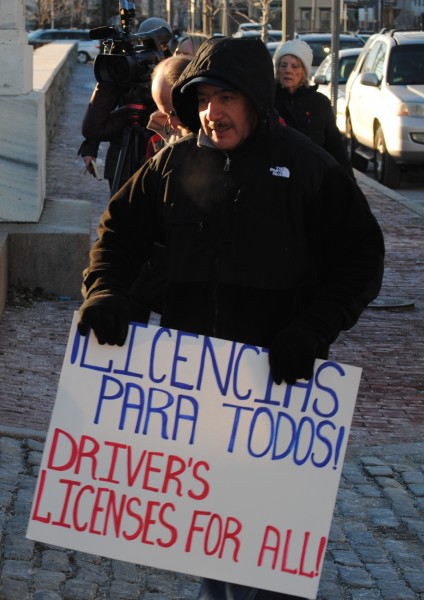

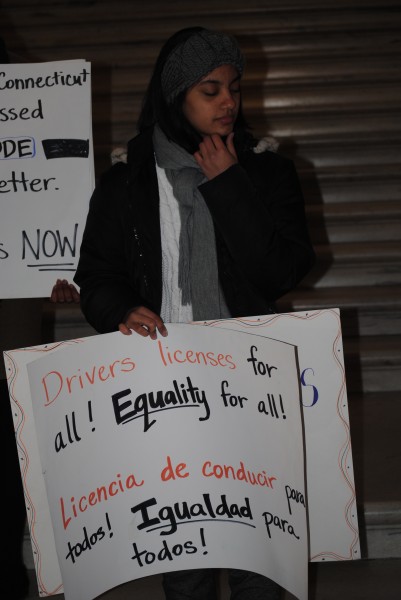
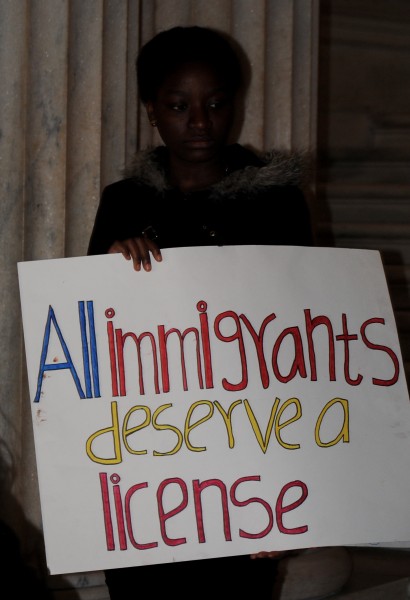



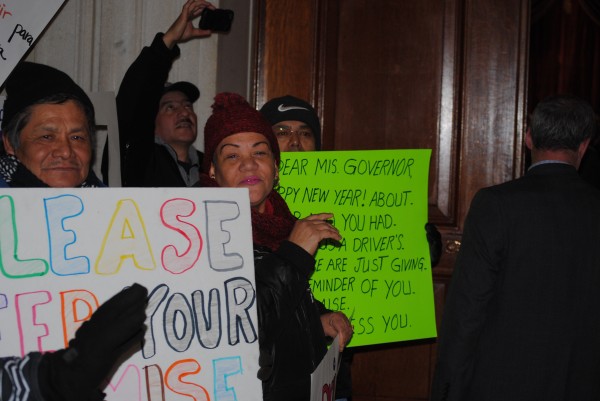

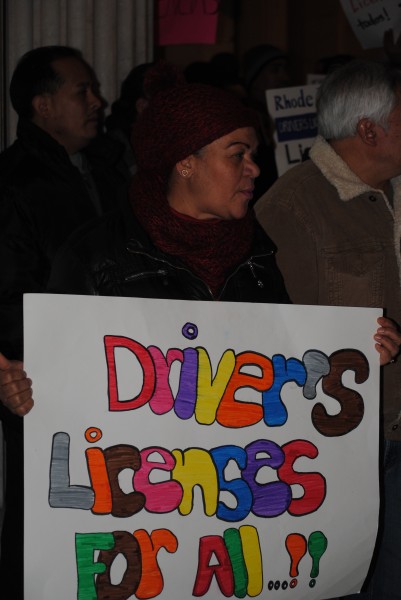
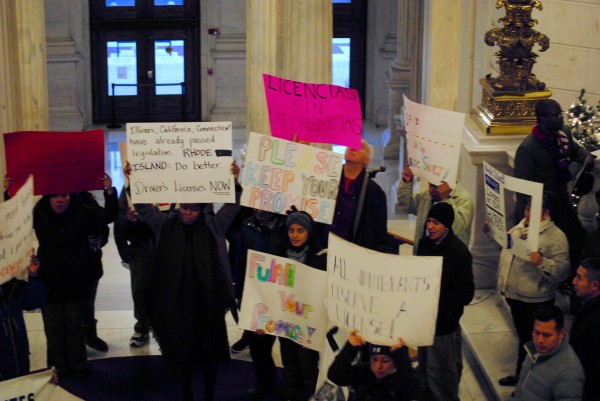

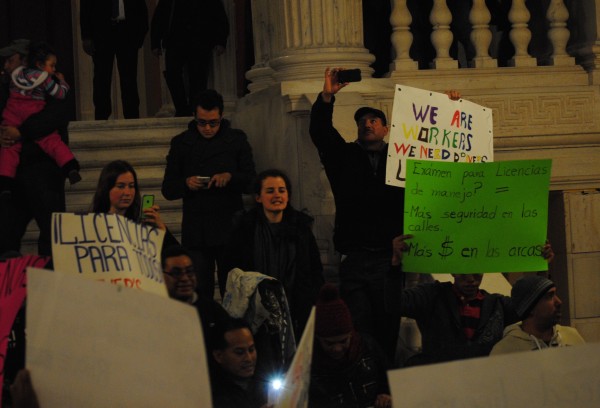
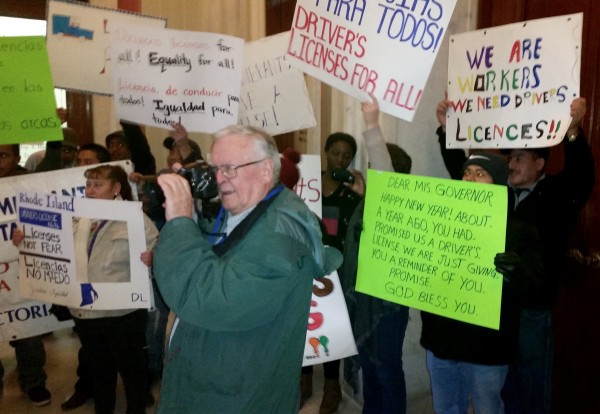
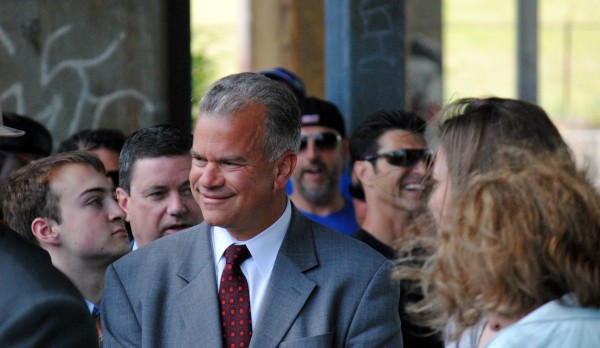 The prospect of Governor Gina Raimondo’s Rhode Works legislation hitting the House floor before the end of this legislation is highly unlikely, Speaker Nicholas Mattiello said today.
The prospect of Governor Gina Raimondo’s Rhode Works legislation hitting the House floor before the end of this legislation is highly unlikely, Speaker Nicholas Mattiello said today.
“Right now, I’m not planning on it coming to the House floor by week’s end,” he said. “I have substantial concerns. I’ve indicated that the House is not going to act upon this bill until the concerns of our local business community are adequately addressed.”
Speaker Mattiello also said that he believes the proposal requires more analysis, so he is not comfortable introducing it in the House quite yet.
“It’s a big proposal, a big project, and I think the calls for it to move forward thoughtfully are probably the right calls and the right way to approach this. There’s no reason to rush this, there are reasons to do it in a timely manner, but there’s absolutely no reason to rush it,” he said.
This announcement comes a day after the Park Avenue bridge in Cranston was closed by RIDOT due to safety concerns. The bridge was suffering from severe deterioration and was “in imminent danger of collapse,” RIDOT Director Peter Alviti said in a letter to the Governor.
Speaker Mattiello finds the closure curious considering the bridge was examined nine months ago, and was deemed structurally deficient, but safe for travel.
“Where I call for an investigation is, you have the DOT making an assessment that it requires a high degree of corrective action in order to stay open, and no action is taken for nine months,” he said. His main concern is that Cranstonians, and especially safety vehicles, are now incredibly inconvenienced, because no steps were taken to prevent the closure.
“If they knew nine months ago that it was going to require a high priority of corrective action, why wasn’t any corrective action taken? That is something an investigation by DOT, I’d like to know what they’re doing.” he said.
Speaker Mattiello added that DOT is at fault for the closure, as they did not do what they are called to do for the community.
“You can’t just let a bridge go to the point of failure and say ‘Sorry, we’re shutting it down because we failed.’ That’s what they’re doing. They didn’t ask for anything, they didn’t tell us they had any concern.”
However, the Speaker did note that he agrees with RIDOT’s decision, but wishes that they take corrective action to have the bridge open back up as soon as possible.
Currently, there are nine bridges throughout the state undergoing investigations, and 17 that have been completed through RIDOT’s accelerated inspection program, which Alviti ordered in early May.
The timing of the closure did not work in Rhode Works’ favor. Minutes after the bridge was closed, Senate Finance unanimously approved the bill, and later that night it was approved on the Senate floor in a 33-4 vote. If the closure was a stunt to get Mattiello’s attention, he was not impressed.
“I can tell you it’s not going to force my hand on Rhode Works,” he said. “That’s not the right way to get my attention.”
]]>One of the biggest concerns for the committee was the success of the program, and whether or not RIDOT will actually be able to pay back the $500 million bond they are asking from the state, as well as make good use of the total $1.4 billion to fund the program. Representative Patricia Morgan (R- District 26) has been Rhode Works’ most vocal opponent, wondering why RIDOT cannot repair bridges with its existing funding.
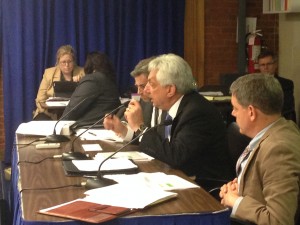
Peter Alviti, the director of RIDOT, said the existing funding they have is not enough to sufficiently repair or reconstruct the 155 bridges that are structurally deficient.
The $500 million bond would pay the expenses for the 17 possible toll locations, leaving that money open for other locations.
“The rest of the money would then have adequate funds to not only reconstruct, but to operate and maintain the facilities,” he said.
Jonathan Wormer, director of the Office of Management and Budget, added that the borrowed money for the initiative would be used to keep bridges from becoming structurally deficient, because they would have the money up front to do so. The goal of the bond is to compress the time in which the bridges can be reconstructed.
“If you don’t fix them at the beginning, it costs them a lot more later,” Wormer said.
The revised version of the bill also contains $13.5 million worth in tax breaks and property rebates for truckers, as well as per day toll caps, which have raised questions about its legality. Some have expressed fear that the tax breaks would discourage interstate commerce, and violate the commerce clause in the United States Constitution. But, RIDOT has asserted that the breaks and tolls are legal.
After nearly three hours of questioning, the Rhode Island Trucking Association, which has opposed the bill from the beginning, brought in American Trucking Association Vice President Bob Pitcher to speak on their behalf.
“We object to the bill before you because of the means it would use to raise the money,” he said. “We believe the proposal would weaken Rhode Island’s economy unnecessarily.”
The biggest objection by Rhode Works opponents is that legislators are rushing into signing it in the last days of session, and possibly overlooking any flaws it might have.
“I’ve never seen anything so vague in a tax law. Tax laws normally say who pays what, and this one does not,” Pitcher continued, adding that Rhode Works is an unprecedented piece of legislation. “No other state has sought to toll multiple state highways or bridges. Because there is literally no experience in such tolling elsewhere, Rhode Island should be doubly cautious.”
In their calculations, RIDOT estimated a 25 percent diversion rate, or that 25 percent of truckers would avoid going through Rhode Island if they were to implement the tolls. Both Alviti and Wormer expressed that this number was very conservative, especially because the plan minimizes the chance for diversions. They also added that only about two percent of trucking companies’ budgets are spent on tolls. Pitcher believes that they have underestimated their diversion rate, in part because tolls don’t exist in large parts of the country.
Many other opponents came forward to testify against the bill, reiterating the worry that the bill has been moving through the State House too fast. In a press release, the Rhode Island Trucking Association called upon Governor Gina Raimondo to create a committee to investigate the bill, rather than push it through at the last minute.
“This process is moving entirely too fast and there have been no discussions or analysis on the fiscal impact of the proposed toll plan to the trucking industry or the business community,” said RITA President Christopher Maxwell.
Other groups have shown support for Rhode Works, including AAA Northeast, The Sierra Club, Grow Smart RI, and Building America’s Future, a national, bipartisan group of elected officials dedicated to infrastructure improvement.
No vote was taken on Monday, but a vote on a version of the bill expected in Senate Finance on Tuesday.
]]>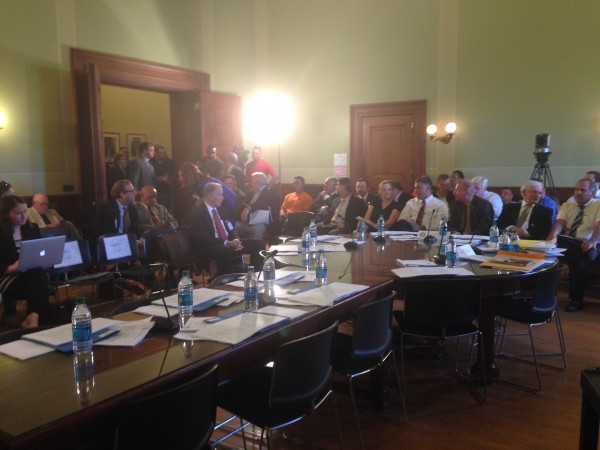
A Senate version of Governor Raimondo’s truck toll proposal, also known as Rhode Works, contains tax breaks for truckers.
The new version of the bill, sponsored by Sen. Dominick Ruggerio (D- District 4), and heard by the Finance Committee Thursday, includes $13.5 million in tax credits and rebates for truckers. They would receive tax credits on their registration fees, rebates on their gas and property taxes, as well as $3 million in grants for those who frequent TF Green Airport and Quonset Business Park.
RIDOT has also slightly reworked their funding formula for the proposal, asking for $500 million in revenue bonds, rather than $700 million. According to Director Peter Alviti, the difference would be bridged by refinancing some of the debt the Department already owes the state, which would give them another $120 million. Without that $80 million to complete the funding, Alviti said the Rhode Works program would be extended over a longer period of time, 30 years, to achieve the same goal. With this new schedule, RIDOT’s interest would increase, and they would eventually pay back $1 billion to the state. According to RIDOT, the total funding for the project would be over $4 billion.
The proposal is based on a serious need to repair Rhode Island’s bridge and road infrastructure, which is ranked 50th in the United States. During the hearing, Alviti stressed safety as one of the main reasons for Rhode Works’ existence.
“This is becoming a more frequent problem, and it will become more frequent in the days and weeks coming unless we do something now,” he said.
The program would also create 11,000 job years in the construction industry. RIDOT also anticipates $60 million each year in revenue from the proposed tolls, $38 million of which would be put towards fees owed to the state. Any other revenue from tolls would directly go towards the repair of bridges and roads. RIDOT plans to reconstruct 155 bridges using this money, as well as upkeep others that are currently in fair condition. The tolls would only charge tractor-trailers, costing them $.69 per mile in Rhode Island, while most other states in the northeast are $1 or more per mile.
“It’s understandable that there’s a certain amount of resistance to the changes we’re proposing. But it’s a fair cost,” Alviti said.
Jonathan Wormer, the director of the Office of Management and Budget, also gave testimony in support of Rhode Works, and explained how much these tolls will end up costing the trucking companies. There are 123 trucks that drive explicitly in Rhode Island all day, whose tolls would be capped at $60 for the whole day, costing the company just under $1.8 million. The 3,111 interstate trucks that come through the state would be capped at $30 per day, and cost $14.9 million. Such toll costs are only about two percent of what companies spend per year. Fuel is considerably more, at 39 percent.
These fees would be collected via EZ Pass, which many truckers that pass through the state already have. If they do not, RIDOT would also implement camera technology that would charge the owner of the license plate. Alviti stared during the hearing that they would not build any tollbooths that would hold up traffic. There are 17 possible locations that the department is looking to install these gantries.
Although most of this information has been revised from the previous bill, Christopher Maxwell, the President of the Rhode Island Trucking Association, said it’s still not ready to become law. “The debate and dialogue should continue, it should not end now. It should begin now that we have all the information,” he told Senate Finance members.
Maxwell believes that directly tolling tractor-trailers will violate the commerce clause in the United States Constitution, and discourage interstate commerce. He stated that no other state is exclusively tolling trucks.
“This does clearly put interstate commerce, and these carriers that you’re not giving breaks to, at a disadvantage,” he said. So much of a disadvantage, that Maxwell added that his association could provide legal proof that such a toll would violate the commerce clause.
“We want to be part of the solution, we are not part of this bill,” he added, citing that the association does have ideas on what RIDOT should do, but did not offer an explanation of what those ideas are at the hearing.
Local truckers came to speak out against the bill as well. Frank Nardone, one truck driver, explained that he avoids tolls in almost all of his routes, and Rhode Island would be no different.
“I don’t like to pay tolls, I don’t think they’re necessary,” Nardone said. According to Nardone, tolls are not the way to make money, especially because Rhode Island truckers already have to pay $388 for the road use tax.
“I think I’m being taxed enough,” he said.
Ed Alfredi owns a trucking company based in Smithfield, and in his testimony, said that Rhode Works makes it impossible to figure out exactly how much the tolls would cost his business.
“If I was to try and sit down, and see what this was going to cost me and my company, it’s very difficult, because there’s no facts,” he said. “It’s going to have an effect, and we should be able to have an exact figure of what these tolls are, where exactly they’re going to be.”
Time is of the essence for the governor’s proposal. While those opposed want more, those in support keep pressing forward, wanting to pass the legislation as quickly as possible. If their efforts fail, Speaker of the House Nicholas Mattiello has hinted at a special fall session in order to fully consider the bill.
]]>Singling out one industry
The trucking industry has been remarkably successful with a talking point: they say that tolling trucks is “singling out one industry” for a special charge. This raises the hackles of business-oriented members of the Assembly.

The truth of the matter is that truckers are being singled out: for an unusually large subsidy. Director Peter Alviti of RIDOT spoke Monday night for several hours at the Finance Committee meeting, and one of the most important points he made is that trucks cause around 3/4 of the damage on roads, but only pay 19% of the costs of upkeeping them. With new tolls, that number would double, but essentially trucks will still be paying fifty cents to the dollar for the damage they leave behind them.
Some members of the Finance Committee were concerned at what it would mean if trucks decided to circumvent Rhode Island for through-trips. While it’s always smart to think about how a particular tax or fee might be evaded, in this case the worry doesn’t make sense. The truckers are like customers who show up to your lemonade stand: each cup is costing you a dollar to make, but you charge them $0.50 each time. This is a financial loss. You can’t make up that loss on volume, as any fifth grader could tell you. And so the only trucks we should really want in our state (at least at the present toll rates) are those that directly serve our households or businesses. And try as they might, truckers who are coming to directly serve us can’t avoid the tolls.
Fiscally-conservative urbanist blog Strong Towns talks very clearly in this article about why “the real welfare Cadillacs have 18 wheels.”
Why are we bonding for infrastructure?
A serious concern which may be holding up tolls are questions about whether we should be bonding (taking on public debt) to fund infrastructure projects. The tolls raise $700 million plus $200 million for debt service to repay the bonds. Concerns about bonding were raised by left (Rep. Tanzi) and right (Rep. Patricia Morgan), but were generally raised more intensely by conservative members of the Finance Committee.

Director Alviti pointed out that the long-term cost of our bridges falling into disrepair and needing to be completely replaced is much higher than the $200 million in debt service. Of course, said the director, there is a cost to financing these projects. But the overall net effect is a savings for taxpayers. Alviti used a metaphor over and over: fixing a road or bridge now is akin to replacing the broken hinge on a door. Waiting for perfect financing is like letting the door fall off the hinges and break entirely.

I agree with Director Alviti’s metaphor, but would like to expand on it. Debt service to help us fix our projects now is somewhat akin to fixing a hinge, instead of replacing the door. The difference is that in Rhode Island, we have a house that has too many doors.
With 4:7 dollars from the tolls going to capital expenses for the 6/10 Connector, the state should be giving serious consideration to whether we’re overbuilt in our highway system. Already, I’ve been very encouraged (and, frankly, surprised) at the outpouring of bipartisan support for exploring a boulevard on 6/10 to save money. A boulevard would be better for Providence and Cranston neighborhoods, would be better for our environment, but would also greatly reduce costs. This morning, Rep. Patricia Morgan tweeted me to signal her support, joining a consensus that includes West Side Councilman Bryan Principe, UNITE-HERE local 217, Environmental Committee Chair Art B. Handy, Minority Leader Brian C. Newberry, and Rep. Daniel Reilly. You really could not find a more politically diverse group of people who agree on this issue. As Speaker Mattiello explores whether to continue to subsidize the trucking industry, he should address the concerns of fiscal conservatives by including language in the toll bill requiring RIDOT to explore reduction of highway capacity as a cost-saving option.
Contact the Speaker
It needs to be clear to Speaker Mattiello that Rhode Islanders expect him to charge a fair(er) price for truck use of our highways. To not do so is to put the cost on the backs of other road users, and possibly leave our roads in a condition that is embarrassing and unsafe. But Mattiello should address the concerns of fiscal conservatives as well, mandating a reduction of costs by an over-stretched RIDOT.
Fiscal conservatives and environmental/social justice liberals have a budding consensus that part of the problem with our road system is that we’re spending too much money for bad outcomes. Addressing this is a way forward: The Speaker can reduce the overall amount of money needed to be raised, thus lowering tolls. Conservatives will feel that they’ve had a victory. Liberals, too, will be happy. And our state’s infrastructure needs will be addressed in a way that gives all sides part of what they want.
Contact Speaker Mattiello’s office, and email me at transportprovidence@gmail.com or tweet me @transportpvd to let me know that you have.
~~~~
]]>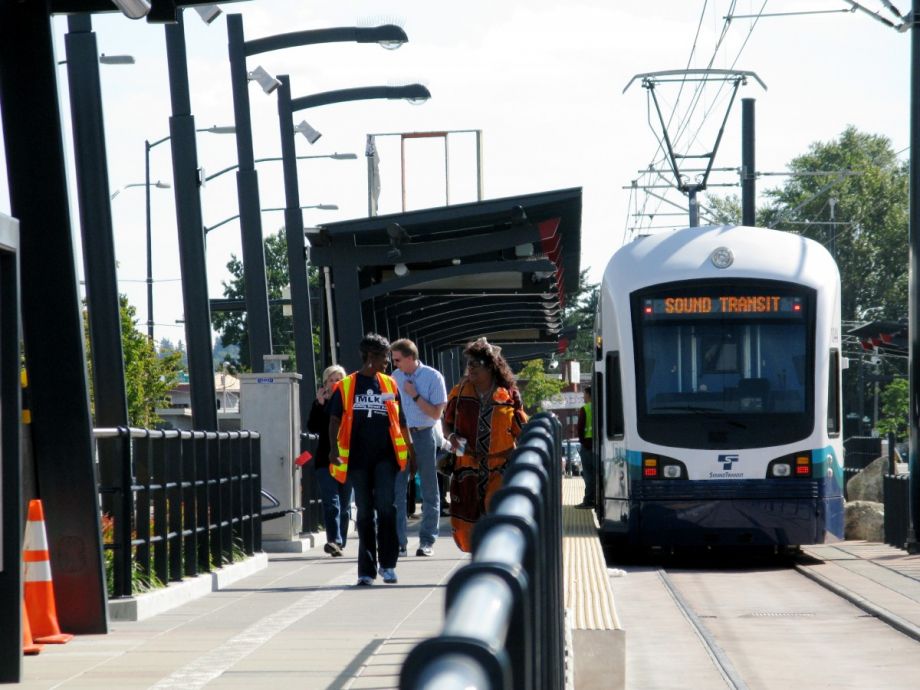
Over and over, I have had many frustrating conversations with people who don’t understand how egalitarian policies and land-use/transportation fit together, to the point that I’ve been working on a piece to parse apart the details. Just as I was on my fourth or fifth draft, a perfect example of people having all the right impulses in all the wrong places fell right into my lap like a ripe apple.
Exhibit A: Seattle advocates want to fix poverty by complaining about development and subsidizing parking. Face palm! According to The Next City, a Philadelphia-based urbanist blog, the proposal would:
1) Honor all requests for low-income restricted parking zone; 2) Charge no more than five dollars per year for low-income restricted parking permits; and 3) Allow restricted parking zone permits for registered nonprofits located within a restricted parking zone.
The Next City goes on to say:
On its face, Sen. Jayapal’s revision reads like a NIMBYish cry to protect her constituents’ parking as transit expands and density increases.
Ding ding ding! We have a winner! But then The Next City says:
In reality, it is part of a broader effort to protect some of Seattle’s most diverse and lowest-income communities from the high risks of displacement that rode into the neighborhood on light rail.
Um, no.
A tri-cornered hat
There are three basic progressive policy choices on any given issue, but the three do not always overlap. It’s important to understand the differences between them, because shooting from the hip without clarity sends you all over the map.
- Leave people alone. This is like the null hypothesis. There are lots of times when we should do something, but having a policy choice that says “do nothing” reminds us to think clearly about what we’re trying to accomplish, and whether we’re overstepping our bounds and creating a new problem out of whole cloth.
- Set a policy that equalizes people’s position. This is a huge one. There’s no end to the moral and practical reasons we should want to eliminate the unnatural wealth gap that exists in this country.
- Set a policy that incentivizes people’s behavior. Of course, fighting inequality relies on incentives, but the best poverty fighting does that and leaves everything else alone. So this category sums up policies that incentivize other things; examples include pay-as-you-throw trash collection, tolls and congestion pricing, and fines for not shoveling one’s sidewalk.
These three policy goals are not the same! Don’t tell me that pay-as-you-throw trash collection means that creating more trash costs more, and is therefore regressive. That would be the case if we fail to have option #2 in our policy array, because then very unequal people would be paying market prices without any counterbalance to ensure they stay within reach of one another. And for sure, our country doesn’t do very well with #2. But Fixing the lack of equality with #1 or #3 doesn’t work. It just creates a mess.
Let’s break it down
 Leave it alone: Gentrification, which I will define here as the displacement of poor people from a neighborhood when wealthier people move in, mostly doesn’t exist. So at the outset, I bristle at the article because it misdiagnoses a positive thing as a problem.
Leave it alone: Gentrification, which I will define here as the displacement of poor people from a neighborhood when wealthier people move in, mostly doesn’t exist. So at the outset, I bristle at the article because it misdiagnoses a positive thing as a problem.
A very wide-ranging study of 1,100 U.S. Census tracts from 1970 to the present shows that most high poverty census tracts stayed that way, that we actually gained some high poverty Census tracts, and that those Census tracts that did get new investment mostly maintained the same number of low income people, while simply gaining higher income people alongside them (that mix, the study found, actually ameliorated poverty, while in the most isolated Census tracts, poor people’s lives got worse). Although not concerned by gentrification per se, the study concluded that poverty remains a serious, wrenching problem that should actively confronted by government. Daniel Kay Hertz does a really great breakdown of the information in the context of Chicago, and This Old City has some great, specific data on housing prices in Philadelphia (the data pre-date the study). The point is, the model we have that says we have to jump in to stop gentrification is mostly wrong.
If your neighborhood is popular, that’s a good thing. But you should make sure there’s enough housing to allow everyone to enjoy that. And in a lot of cases that means leaving things alone.
Equalize people: The same study on gentrification that concluded that housing development should be allowed to happen, even encouraged, in gentrifying areas also concluded that deep, centralized, isolating poverty remains a problem in the U.S. It won’t be news to anyone here that poverty is, in fact, growing. So while under #1. we talked about how to leave something alone that’s not a problem, under #2 we should focus on how to change something that is a dire problem.
Some of the best programs that equalize people included the 1950s consensus to have an income tax system that decreased the income and wealth gap in the U.S. by creating an effective maximum wage, a proposed program for a guaranteed minimum income or its cousin the Earned Income Tax Credit. Other examples include the Estate Tax, which at the federal and state level has always been a way to equalize the inherited wealth gap. What’s perfect about these programs is they very squarely take on the problem of the rich getting richer and the poor getting poorer, but they stay hands off about exactly what it is that people do with the money beyond that. But that brings us to #3. . .
Incentivize behavior: In general, it’s good to let people have choices, but sometimes there is a society-wide reason for pushing people to make a particular decision. You would hope that one of the behaviors that cities would want to encourage would be driving less, and in fact, Seattle is a city that has made huge strides in that direction, moving from above 50% of urban core trips by single-occupant drivers to just around 30% in just a short time. But a program of subsidizing parking, though intended to accomplish the goals under #2, is actually a really bad conflation with #3. It incentivizes behavior: the wrong behavior.
These three categories fit together. You want to leave alone development–i.e., gentrification–and in fact, where housing prices have risen to the point of pushing low income residents out, it has been because zoning or other policies have gotten in the way of housing growth. You do want to take from the rich and give to the poor, but not in a way that interferes with that. And you absolutely want to push people away from cars, so your incentives shouldn’t nudge people towards them.
We get these three all mixed up. We don’t leave housing development alone. We put all sorts of constraints on it, from not allowing federally-backed lending for apartments, to zoning against density and for parking, to spending more than half of our road money on road expansion in order to encourage sprawl. We certainly don’t effectively deal with poverty. The top income tax rate used to be 90%, and the point of that was to create a disincentive against ridiculous executive salaries, simply and elegantly, and instead incentivize reinvestment into middle income jobs and capital improvements. And everything, everything we can think of goes into making driving easier. Alongside the pittance of money for walking, biking, and transit, we throw huge subsidies towards parking fees, new garages, wider roads, cheaper oil–and all of it, we say, is because we want to keep the American Dream alive.
The results are summed up pretty well by Angie Schmitt:
The suburbs: In exchange for your "free" — not really free — parking you are chained to two cars that cost you 18% of your income. #win!
— Angie Schmitt
(@schmangee) February 25, 2015
And, of course, any policy that mixes things up this way has the potential to help some poor people along with many middle class people, and leave some poor people completely out in the cold.
It’s so frustrating when you’re explaining to someone how to fix transportation or land use policy and that person responds by placing those goals at odds with equity. There couldn’t be anything further from the truth. If we could straighten out the differences between different policy options, we could have clearer conversations about the huge range of problems that face us.
~~~~
]]>As Gov. Raimondo recently pointed out, Rhode Island has some of the highest per-mile costs for road infrastructure. In addition to that, as I’ve pointed out right here at RI Future, much of that road infrastructure is highway oriented, even in our cities. Providence is among a rogue collection of cities in the Rustbelt Midwest, Texas, and California for its lane-miles of highway infrastructure per capita.
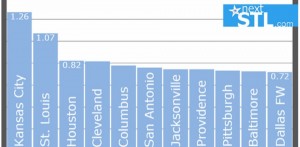
That means that our poorest areas where people often don’t have access to cars are choked by highways, causing air pollution and congestion that would otherwise be avoided with a multimodal system. The costs of this type of highway infrastructure are many orders of magnitude higher than other projects, and also at the same time stand in the way of development in urban areas. These factors act as both a push and pull force against our economic development and climate change goals.
One way Gov. Raimondo has sought to fix the imbalance of spending is to use tolls to provide some of our road funding. I know that there’s going to be lots of howling from all sides, so I want to preempt it and say to the governor, “Thank you! Well done!”
Tolls are not popular on the left or the right. The right, of course, unaware of how socialized and unbalanced policies around driving have become, cries that tolls are a “war on cars“. In Rhode Island, we’ve seen tea party vandalism against toll collection efforts on the Sakonnet Bridge. Sometimes elements of the left don’t understand the issue well either, seeing tolls as a way of stepping away from the responsibility of government to pay directly for infrastructure costs through general funds. I believe both are mistaken.
It’s correct to use government to invest in public infrastructure and lessen inequalities. Road spending is simply the least efficient way to do it. Although all classes of people drive to some extent, the poorest drive the least. Certainly if you want to help the odd person who is poor and happens to drive, there are more direct ways to target the aid. Though road projects cause a blooming of development, the revenue from the development does not add up to enough over the long-term to pay back the costs of the maintenance on infrastructure. Tolls are an equitable way to pay for road infrastructure. Paying for roads in this way also means that the general funds we have can be repurposed to more important and directly progressive goals, like an increased Earned Income Tax Credit in the state.
I call on the governor not only to toll highway-type infrastructure, but also to look carefully at how we can reduce unnecessary road expenditures. We need long distance roads in parts of our state, but our urban areas are far too choked by highways. The Route 10 section of the 6/10 Connector is now the oldest highway in the state, cuts neighborhoods in Providence and Cranston off from one another, makes the Washington Secondary bike path less useful, and prevents development along a prime corridor of urban land. Removing highways like Rt. 10 and building them in less expensive, more multimodal ways would lower our state’s costs, allowing tolls to be less extreme (I think Rt. 6 should go too, but its infrastructure is newer–some of it, in fact, is being replaced at great cost right now–so that may have to wait).
The progressive community needs to put its elbow grease into supporting tolling as one of the tools we use in transportation. It’s up to us to organize and educate constituencies for this, or else the governor’s proposal will fail.
~~~~
]]>